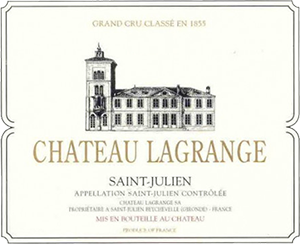| Region | |
|---|---|
| Subregion | France > Bordeaux > Left Bank > St Julien |
| Colour | Red |
| Type | Still |

I awarded the 2006 Château Lagrange a very high score when I tasted it from barrel. It does nothing to dispel my optismism in bottle after ten years. It has a lively, quite vivacious bouquet with blackberry, briary, cedar and violet scents, almost Margaux-like in style. The palate is medium-bodied with a fine grip in the mouth. The acidity here is well judged, extremely well focused with impressive weight and structure on the finish, backed up by that tobacco-stained fruit. You cannot go wrong with Lagrange in this vintage.
A very strong effort from Lagrange in 2006, this estate's tendency for including a nearly overwhelming oak component in its wines has been tamed in this cuvee, resulting in a better-balanced, potentially complex offering. A deep opaque purple color is followed by aromas of espresso roast, subtle pain grille, black currants, and cigar box. Full-bodied and surprisingly powerful for a 2006, with outstanding purity, texture, and depth, patience will be required for this beauty. Anticipated maturity: 2013-2027.
Very pretty mineral and black berry aromas. Full-bodied, with a solid core of fruit and a long silky finish. Very good indeed. Almost 92-94
Dark cassis and bilberry from the first moments, with the tone of the wine showing powerful concentrated fruits and firm tannins that remain imposing at 16 years. An excellent 2006, one for lovers of St Julien, and of savoury Médoc spices. A handover vintage in terms of the winemaking team, the last one fully under Marcel Ducasse with Mathieu Bordès arriving for the blending. Harvest Sptember 18 to October 5, 60% new oak for ageing. Eric Boissenot consultant.
Very dark purple. Slightly sweet oaky note - maybe a bit too much. Fresh fruit on the palate with some tobacco leaf flavour. Dry tannins. I appreciate the palate much more than the nose. Drink 2012-2020.Date tasted 7th Nov 08
Bright red-ruby. High-pitched aromas of blueberry, cassis, bitter chocolate, pepper, herbs and violet. Enters the mouth suave and smooth, then builds and expands toward the back, offering classic black fruit, licorice, mineral and violet flavors and saturating the palate with fine, dusty tannins. The floral finish offers lovely lift and sneaky persistence.
A strong effort for this estate, the 2006 Lagrange competes with the finest wines of the appellation. One of my pet peeves with this wine is that the oak is often excessive, but in this vintage, it is beautifully integrated, allowing the sweet cassis, licorice, herb, and spice box notes to dominate. Ripe and medium to full-bodied with moderately sweet tannin, abundant fruit, and a long finish, it is similar to the 1996 Lagrange, with perhaps more fruit. Time will tell. Anticipated maturity: 2012-2027.
Tasted at the UGC. This is a wonderful Saint Julien, one of the finest of the appellation. The nose is rather pinched at this stage, but reluctantly reveals aromas of freshly tilled earth and gravel. The palate is well-structured, dense and muscular with very fine acidity. Focused with great delineation, it has a similar personality to Grand-Puy Lacoste. Very good length, unmistakably Saint Julien. Great breeding and typicity here. Do not ignore this wine. Tasted April 2007.
Marcel Ducasse’s last vintage before retirement.
Black! Black fruits, black liquorice. Good, neat, quite dry fruit but pretty chewy and drying on the finish. Needs quite a time to melt. Very slightly fizzy. Well done - cross between ancient and modern styles if closer to modern. Just slightly hollow. A little bit sweet.
Bright ruby-red. Pure, vibrant aromas of cassis, flowers and minerals. Juicy and concentrated, with black fruit, mineral and floral flavors complicated by hints of camphor and mint. This dense and rather backward wine spreads out to coat the palate. Finishes with mouth-dusting tannins that will require patience. Despite the substantial merlot component, this comes across as a classic cabernet vintage. Like a more powerful version of the 2007-in fact, says Eynard, we didn't need the petit verdot for structure in 2006.